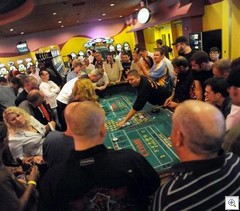 Colorado offers a state lottery, charity games and raffles, pari-mutuel horse- and dog-race betting, and casino gambling activities. The modern era of gambling began when the lottery was initiated in 1983 for the purpose of raising funds for parks and environmental projects. As with many other lottery states, the normal legislative funding for these projects was reduced in accordance with the lottery gains, however, and in effect the lottery money simply went into the general fund of the state. The experience only confirmed that it is very difficult to have lottery funding for any on-going programs that are normally funded by legislative action. The “modern” situation of using lotteries for regular government programs is contrasted with the experience in colonial times when lotteries were utilized to fund specific capital projects – college buildings, roads, bridges, military arms.
Colorado offers a state lottery, charity games and raffles, pari-mutuel horse- and dog-race betting, and casino gambling activities. The modern era of gambling began when the lottery was initiated in 1983 for the purpose of raising funds for parks and environmental projects. As with many other lottery states, the normal legislative funding for these projects was reduced in accordance with the lottery gains, however, and in effect the lottery money simply went into the general fund of the state. The experience only confirmed that it is very difficult to have lottery funding for any on-going programs that are normally funded by legislative action. The “modern” situation of using lotteries for regular government programs is contrasted with the experience in colonial times when lotteries were utilized to fund specific capital projects – college buildings, roads, bridges, military arms.
There was one difference that citizens noticed in Colorado after the lottery was initiated. Many of their state parks had signs proclaiming that the park was being supported by the lottery, which of course was true, but possibly also false. In some states the lottery money is added to budgets; however, it is difficult to trace the funds. Often they are merely shifted from one program to another one.
In November 1990, the voters were persuaded to approve limited-stakes casino gambling for three mountain towns – Blackhawk, Central City, and Cripple Creek. The gambling rules were patterned after those in South Dakota – five-dollar maximum bets on blackjack and poker games and on slot machines. One of the motivations for voter approval was the fact that the casinos of Deadwood were marketing their gambling to players from Denver, the largest city within a one-day drive of Deadwood. Even though the governor opposed the proposition, it passed with a 57 percent favorable vote. The number of casinos in existence at one time has fluctuated considerably from over eighty to fewer than sixty—the approximate number as the new century began.
Subsequent to the successful vote, several other towns in Colorado have sought voter approval for casinos, only to have their propositions lose by big margins. Two of the three towns with casino gambling, Blackhawk and Central City, are located on winding mountain roads about one hour west of Denver, and the third town, Cripple Creek, is one hour west of Colorado Springs. How the three towns were picked for the ballot proposition in 1990 is no mystery. In 1989, leaders from a group of about a dozen communities approached the legislature and requested passage of a law permitting casino gambling in their venues. They received very serious consideration; the legislative votes were close, but the proposal was defeated. Afterwards, a few of the leaders decided that the only way they could succeed would be to circulate petitions and secure a statewide vote on a constitutional amendment permitting casinos. Since these campaigns are expensive, the leaders of the effort asked the dozen communities to fund the election. Most of the towns declined to make a financial contribution to the campaign. Blackhawk, Central City, and Cripple Creek, however, agreed to make the financial commitment necessary for a successful campaign. The leaders decided that if this were the case, the casino proposition would apply only to these three towns.
Casino policies – rules and regulations, taxation and licensing actions – are determined by a five-member Colorado Limited Gaming Control Commission. The policy enforcement activities are conducted by the Colorado Division of Gaming, an agency within the Colorado Department of Revenue. The amendment approved by the voters permitted the taxation rate to be as high as 40 percent of the casino win. The top rate in a progressive tax structure, however, is 20 percent of the gambling revenue. There are also extensive fees charged by both the state and local governments. For instance, the local governments charge between $750 to $1,500 annually for each gambling device (machine or table). The state requires each employee to go through a licensing process and pay a $200 fee before working in a casino.
The slot machines in the casinos must pay out in prizes at least 80 percent of the money that is played. Unlike South Dakota, the state has no fixed limit on the number of machines in a casino. Many have several hundred machines. There are over 13,000 machines in the sixty or so casinos.
The ostensible purpose of the Colorado gambling has been to aid in tourism development. State taxes, however, go to the general fund directly. Moreover, the overwhelming numbers of players – certainly over 90 percent—are from the two metropolitan areas located near the casinos.
|
|